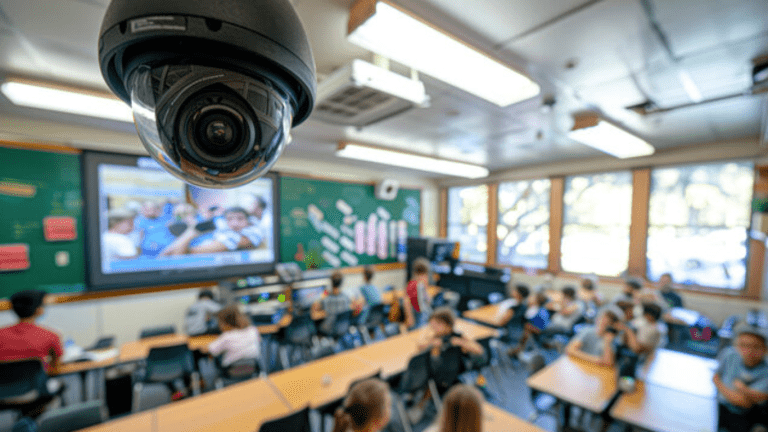The Rawalpindi Board of Intermediate and Secondary Education (BISE) is making significant strides to modernize the examination process in its jurisdiction. In an effort to maintain the integrity and fairness of examinations, the board has announced the installation of CCTV cameras in all examination centers across the Rawalpindi Division. This decision is part of BISE’s commitment to using technology for enhancing transparency, eliminating malpractices, and ensuring a level playing field for all students.
With the growing concern about cheating and other forms of examination misconduct, the introduction of CCTV surveillance is a timely and much-needed solution. This article will explore the steps being taken by the Rawalpindi Board, the benefits of this initiative, and its potential impact on students and the educational system.
The Role of CCTV Surveillance in Exams
The main goal of installing CCTV cameras in exam halls is to prevent any unfair practices that could compromise the integrity of the examination process. Over the years, incidents of cheating and malpractice during exams have tarnished the reputation of educational systems across the country. By introducing surveillance, the Rawalpindi Board seeks to deter students from indulging in any form of dishonesty, ensuring that the results of the exams reflect the true abilities of the students.
CCTV Installation in Examination Centers
The CCTV cameras will be strategically placed in every exam hall across the Rawalpindi Division. These cameras will cover all corners of the hall, providing real-time monitoring of the entire exam process. The footage from these cameras will be closely monitored by a dedicated team of supervisors who will immediately address any suspicious activity.
This move is aligned with the broader goal of using technology to ensure that all examination procedures are carried out with the utmost transparency. The Rawalpindi Board recognizes that technology plays a crucial role in modernizing education systems and is embracing it to maintain fair and credible assessments.
Upgraded Paper Marking Procedures
Alongside the installation of CCTV cameras, BISE is also focusing on improving the paper marking process. Traditionally, paper marking has faced challenges related to transparency, accuracy, and fairness. In response, BISE has introduced a new system to enhance the accuracy and reliability of paper evaluations for annual, supplementary, and practical exams.
This upgraded system will involve more stringent checks, improved training for paper markers, and a more transparent grading process. The new paper marking procedures are designed to eliminate any potential biases and ensure that students’ performance is assessed fairly and objectively.
Collaboration and Stakeholder Involvement
To foster a better understanding of the changes being implemented, BISE is hosting a seminar on December 17 at Rawalpindi Women’s University. This seminar will bring together a diverse group of stakeholders, including the Provincial Education Minister, directors of colleges, education experts, professors, and teachers. The purpose of the seminar is to provide a platform for all stakeholders to discuss the changes in the examination system and offer suggestions for further improvements.
The seminar will also address the importance of fairness and transparency in the education system and discuss ways to overcome any challenges that may arise during the implementation of these new measures.
Benefits of CCTV Surveillance in Exam Halls
The introduction of CCTV cameras in exam halls is expected to have a number of positive effects on the examination process and the educational system as a whole.
Prevention of Malpractice
One of the most significant benefits of installing CCTV cameras is their potential to prevent cheating and other forms of malpractice. The presence of cameras will make students more aware of the consequences of dishonest behavior, encouraging them to focus on their studies rather than resorting to unethical means. This will lead to more accurate and honest results.
Increased Accountability
With surveillance in place, the responsibility of maintaining exam integrity will shift from just the invigilators to a broader system that includes video monitoring. This increased accountability is crucial for maintaining the credibility of the examination system. If any discrepancies arise during the examination, the footage from the cameras can be reviewed to ensure that the proper procedures were followed.
Transparency in Paper Distribution
In addition to monitoring the exam halls, CCTV cameras will also be used to observe the distribution of exam papers. For the first time, the papers will be opened and distributed in front of the students under the direct observation of CCTV cameras. This will eliminate any chance of malpractice during the crucial stages of the examination process, ensuring that the exam papers are handled appropriately.
Fairer Evaluation Process
The enhanced paper marking system is expected to further contribute to fairness in the examination process. With improved systems in place, there will be fewer chances of errors or biases in grading, ensuring that all students are assessed based on their true abilities.
Steps Toward a Modernized Examination System
The introduction of CCTV surveillance and the revamped paper marking procedures are just a few of the many steps BISE is taking to modernize its examination process. The Rawalpindi Board is focused on creating an examination environment that is transparent, efficient, and free of any unethical practices. Through the integration of technology, BISE is striving to build a system that benefits both students and educational institutions.
Future Plans and Upgrades
In the future, BISE plans to continue investing in technology to further improve the examination process. This includes exploring digital platforms for conducting exams, streamlining the paper marking process with the help of artificial intelligence, and introducing more secure ways of handling sensitive exam materials.
By constantly upgrading its systems and embracing new technologies, BISE aims to set a precedent for other educational boards in Pakistan to follow. The ultimate goal is to create a level playing field for all students, ensuring that everyone has an equal opportunity to succeed based on their hard work and dedication.
Frequently Asked Questions (FAQs)
1. Why is BISE Rawalpindi installing CCTV cameras in exam halls?
BISE Rawalpindi is installing CCTV cameras to prevent cheating and other forms of malpractice during exams. This initiative aims to ensure that all students are evaluated fairly and that the examination process is transparent.
2. Will CCTV cameras be installed in all exam centers?
Yes, CCTV cameras will be installed in all examination centers across the Rawalpindi Division. The cameras will cover every corner of the exam halls to ensure real-time monitoring.
3. What other improvements are being made to the examination system?
In addition to the CCTV surveillance, BISE is also upgrading its paper marking procedures. These improvements are designed to make the grading process more transparent and accurate.
4. How will the seminar contribute to the examination system?
The seminar, scheduled for December 17, will allow key stakeholders such as educators, government officials, and education experts to discuss the new changes and offer suggestions for further improvements in the examination system.
5. Will the new system help reduce instances of paper marking bias?
Yes, the new paper marking procedures are designed to minimize errors and bias in grading. With improved systems in place, BISE aims to ensure that all students are evaluated fairly based on their actual performance.
Conclusion
The Rawalpindi Board of Intermediate and Secondary Education (BISE) is making commendable efforts to improve the integrity and transparency of its examination process. The installation of CCTV cameras in all exam halls across the Rawalpindi Division, along with the upgraded paper marking procedures, represents a significant step forward. By embracing technology and involving key stakeholders in the discussion, BISE is laying the foundation for a more robust and equitable examination system. These efforts will not only benefit students but will also help build trust in the educational system as a whole
MUST READ
ChatGPT’s AI Search Engine Now Available to Everyone



